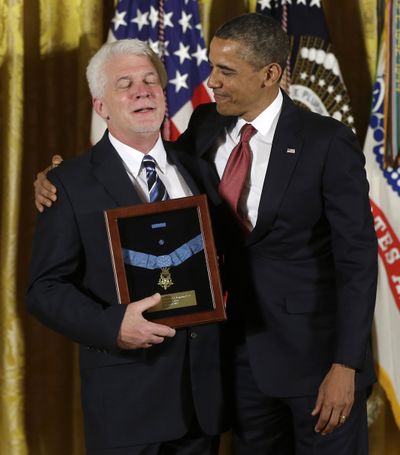Medal of Honor given to ‘kind,’ ‘caring’ hero
Korean War chaplain boosted POWs’ morale

WASHINGTON – When men who served in the Korean War with Emil Kapaun describe him, they do not talk about the acts most commonly associated with the Medal of Honor: He fell on no grenades, captured no enemy machine guns, killed no enemy soldiers.
For those who spent time with him in North Korean prison camps, the Army chaplain’s most heroic acts were sharing food he stole from nearby farms, washing men sick with dysentery and persuading many to keep up the brutal struggle for life. Soldiers use words like “kind,” “caring” and “hope” to talk about him and what he imparted.
Kapaun was awarded the U.S. military’s top honor Thursday in a ceremony at the White House, nearly 62 years after his death in captivity.
President Barack Obama called Kapaun “an American soldier who didn’t fire a gun, but who wielded the mightiest weapon of all: a love for his brothers so pure that he was willing to die so that they might live.”
The medal ceremony was the capstone of a six-decade effort that had been confounded by Kapaun’s unusual brand of heroism. His comrades advocating for the honor were successful only after they shifted strategy away from their most vivid recollections of their beloved leader.
The Medal of Honor is reserved for bravery in combat, but for the men who served with him, the chaplain’s true heroism occurred far from a battlefield in the winter of 1950-51.
“He’s personally responsible for saving hundreds of lives, and probably contributed to saving thousands of lives that winter,” said Mike Dowe, an 85-year-old physicist from Texas who was a prisoner with Kapaun. But that was not enough to qualify for the Medal of Honor.
So Dowe and others decided to tout Kapaun’s conduct during a battle with Chinese forces in Unsan, North Korea. Kapaun’s acts during that combat appear on his official Medal of Honor citation:
“When Chinese communist forces viciously attacked friendly elements, Chaplain Kapaun calmly walked through withering enemy fire in order to provide comfort and medical aid to his comrades. When they found themselves surrounded by the enemy, the able-bodied men were ordered to evacuate. Chaplain Kapaun, fully aware of his certain capture, elected to stay behind with the wounded.”
Kapaun, a Catholic priest from Kansas who held the rank of captain, also negotiated with a wounded Chinese commander to save the lives of a group of trapped U.S. soldiers who had become prisoners. And he pushed aside a Chinese soldier who was about to shoot an American, according to the citation.
Those acts gained traction as Medal of Honor material in 2009, when the secretary of the Army sent a favorable recommendation to Congress. Congress needed to pass special legislation to send Kapaun’s recommendation up the chain of command toward the White House because so much time had passed since the war.
Kansas lawmakers shepherded the legislation to passage in early 2012, allowing the Army secretary’s recommendation to proceed to the Department of Defense, where it lingered until early this year.
In January, Sen. Pat Roberts, R-Kan., called outgoing Defense Secretary Leon Panetta to tell him there was “one thing he just had to do” before leaving office: Get Kapaun the medal. Panetta agreed, Roberts said, pushing the request to Obama, who approved it.
On Thursday, the president presented the medal to Ray Kapaun, the chaplain’s nephew, noting that “Father Kapaun has been called a shepherd in combat boots.” Several Korean War veterans, including Dowe, attended.
“He’s probably one of the most fantastic people ever to have received the medal,” Dowe said.